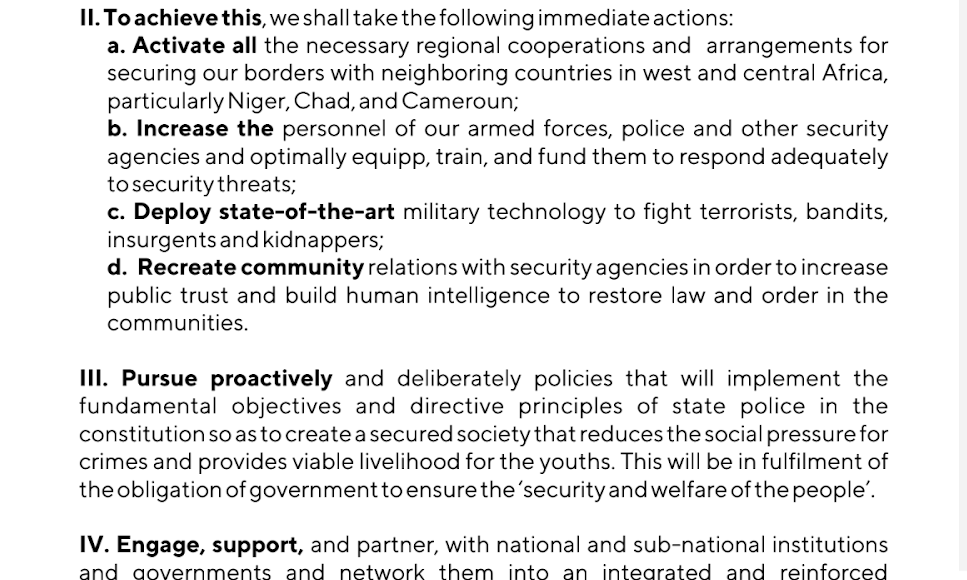After two months of back and forth, we’re pleased to announce the presidential candidate of the Labour Party (LP), Peter Obi, has finally released his manifesto!
The manifesto has attracted mixed reactions from fans and haters alike since Obi announced the 72-page document on December 4, 2022.
But, what exactly is the content of this document?
Introduction of a state police system
Obi plans to put in place policies that would implement the principles of a state police system in the Nigerian constitution. But these could create some problems.

The Senate is already hostile against state policing due to fears that officers will become errand boys for governors who may also neglect to pay them well.
This could become an issue as Obi needs a National Assembly aligned with his interests and plans for the country to succeed. But how many Labour Party candidates are likely to win seats in the National Assembly in 2023?
The All Progressives’ Congress (APC) controls a majority of the current Senate with 66 members and only one of the remaining 43 members is an LP senator.
According to the list released by the Independent National Electoral Commission (INEC), the Labour Party is contesting for only 78 seats out of the 109 seats in the Senate. It also doesn’t help that most of the vacant slots will favour Obi’s rivals more, as there are no Labour Party candidates in key states like Kebbi, Katsina, Lagos, Borno, and Ekiti.
Hourly national minimum rate
Peter Obi’s answer to Nigeria’s low minimum wage problem is to introduce a minimum rate based on one’s productivity per hour instead of the current ₦30,000 per month.

It’s not hard to know where the inspiration for this came from, as Western countries such as Canada, the United Kingdom, and the United States
The plan creates a semblance of fairness, as workers would get paid based on how much time they work. The more hours you work, the more money you get to put in the bag.
Also, this section of the manifesto mentioned the “criminalisation of non-payment of salaries, wages, pensions, entitlements, benefits, and violation of collective bargaining agreements,” which means the law will start frowning at horrible bosses who delay payment of workers.
This is how we imagine every worker would feel if that happened:
Equal pay for politicians and civil servants
Obi intends to implement a Common Regimentation Emolument Structure Table (CREST). This is a policy that’ll enable elected politicians and appointed officials to earn the same as civil servants.

But are the National Assembly lawmakers interested in earning the same paycheck as civil servants?
The move from consumption to production
“Consumption to production” has become a catchphrase of the Obi campaign. We’re not surprised the idea appeared in his manifesto. How does he plan to make it happen for Nigeria?
- Re-skilling youths in the Science, Technology, Engineering, and Mathematics (STEM) field for the nation’s economy. This is needed given that most students in Nigeria don’t feel the need for STEM. This is due to the slow rate of curriculum updates, and poor funding, especially in rural areas.
- Venture capital fund for young entrepreneurs
- Apprenticeship system for technical skills.
- The rise of a “Green Army” whose mission is to use the $3 trillion from international climate finance to create economic growth and employment for youths.
But how does he intend to do that? That definitely wasn’t specified.

Multiple exchange rate system
In his manifesto, Obi expressed his feelings about Nigeria’s current exchange rate system. Here’s what he had to say:

While these problems are true as Nigeria currently has rates from the Central Bank and black markets, we’re still waiting on Obi to give us a solution to the problem.
The Afro-centric diplomacy
Obi also plans to protect the rights of Nigerians abroad through Afrocentric diplomacy. Compared to Nigeria’s current foreign policy which only seeks to promote relations among member countries, his Afrocentric policy has benefits. This would help to both protect Nigerian citizens abroad as well as promote their businesses.
This would be done by rebuilding Nigeria’s military power, establishing leadership roles in African affairs, and even using our top position in entertainment to enhance economic strategies.
This will definitely be a welcome change. Nigerians are suffering from physical harassment overseas even as many more are using any means necessary to japa.




